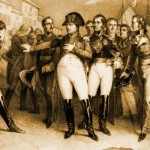On arriving at Paris, three days after Waterloo, Napoleon still clung to the hope of concerting national resistance; but the temper of the chambers and of the public generally forbade any such attempt. Napoleon and his brother Lucien Bonaparte were almost alone in believing that, by dissolving the chambers and declaring Napoleon dictator, they could save France from the armies of the powers now converging on Paris. Even Davout, minister of war, advised Napoleon that the destinies of France rested solely with the chambers. Clearly, it was time to safeguard what remained; and that could best be done under Talleyrand’s shield of legitimacy. Napoleon wrote the following Proclamation to the French People upon his abdication:
Frenchmen: In commencing war for the national independence, I relied on the union of all efforts, of all wills, and the concurrence of all national authorities. I had reason to hope for success, and I braved all the declarations of the powers against me. Circumstances appear to me changed.
I offer myself a sacrifice to the hatred of the enemies of France. May they prove sincere in their declarations, and really have directed them only against my power. My political life is terminated, and I proclaim my son, under the title of Napoleon II., Emperor of the French.
The present ministers will provisionally form the council of the Government.
The interest which I take in my son induces me to invite the chambers to form, without delay, the regency by a law. Unite all for the public safety that you may continue an independent nation.” Napoleon
Napoleon himself at last recognised the truth. When Lucien pressed him to “dare”, he replied, “Alas, I have dared only too much already”. On 22 June 1815 he abdicated in favour of his son, Napoléon Francis Joseph Charles Bonaparte, well knowing that it was a formality, as his four-year-old son was in Austria. On 25 June he received from Fouché, the president of the newly appointed provisional government (and Napoleon’s former police chief), an intimation that he must leave Paris. He retired to Malmaison, the former home of Josephine, where she had died shortly after his first abdication.
On 29 June the near approach of the Prussians, who had orders to seize him, dead or alive, caused him to retire westwards toward Rochefort, whence he hoped to reach the United States. The presence of blockading Royal Navy warships with orders to prevent his escape forestalled this plan.
Finally, unable to remain in France or escape from it, he surrendered himself to Captain Maitland of HMS Bellerophon and was transported to England. The full restoration of Louis XVIII followed the emperor’s departure.


